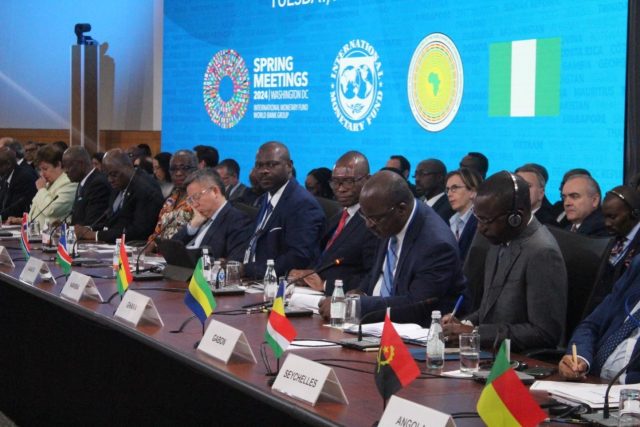By Joshua Worlasi AMLANU
The Governor of the Bank of Ghana, Dr. Ernest Addison, has called for further enhancements to the G20 Common Framework for debt relief, urging the international community to leverage the Global Sovereign Debt Roundtable (GSDR) to promote a rapid, transparent and equitable resolution of debt.
The GSDR is an initiative aimed at building a greater common understanding among key stakeholders involved in debt restructurings. The objective of the GSDR is to work together on the current shortcomings in debt restructuring processes – both within and outside the Common Framework – and ways to address them.
Speaking at the 2024 African Consultative Group (ACG) meeting with the Managing Director of the International Monetary Fund (IMF), Kristalina Georgieva, during the IMF/World Bank Spring Meetings, Dr. Addison stressed the need to facilitate debt cancellation for the most vulnerable members.
“We restate our request for further enhancements to the G20 Common Framework while leveraging the Global Sovereign Debt Roundtable (GSDR) to promote rapid, transparent and equitable resolution of debt as well as facilitate debt cancellation for the most vulnerable members,” Dr. Addison emphasised.
The governor’s remarks come amid continued delays in securing debt treatment for countries in default, such as Ghana, Zambia and Sri Lanka, that are in talks with a wide variety of stakeholders.
“The review of the Fund’s internal debt policies is welcome, but we stress the need to ensure that the changes are impactful and achieve their intended purpose,” Dr. Addison added.
In his statement, the governor underscored the urgency for stronger support from development partners, including the IMF, to help African countries navigate the complex domestic and external challenges they face
“Our domestic adjustment policy efforts without adequate financing can only yield limited results in the context of the complex domestic and external environment,” Dr. Addison said.
“As such, stronger support from the development partners, including the IMF, remains paramount,” he added.
The governor underscored several critical priorities for the IMF to better support its vulnerable members in Africa. Primarily, he emphasised the importance of the forthcoming comprehensive review of the IMF’s facilities for low-income countries (LICs) to preserve the concessionality of the Poverty Reduction and Growth Trust (PRGT) and enhance access to counter the exacerbated erosion stemming from the current global inflationary pressures.
“We also underscore the criticality of replenishing the Catastrophe Containment and Relief Trust (CCRT) resources envelope to offer grant support to our most vulnerable members in this shock-prone world,” the central bank governor said.
The governor further called for meaningful collaboration between the IMF and the World Bank to better align their support to LICs. “In this regard, we stress the need for coordination of the IMF’s LIC Facilities Review with the World Bank’s IDA21 replenishment efforts to support LICs in a holistic manner.”
Dr. Addison stressed the need to keep all financing options on the table, including the use of the IMF’s internal resources.
“In view of the recent multiple shocks and a crisis like no other, now is the opportune time for a modest gold sale, particularly when gold prices are still favourable,” he concluded.

















